人教版小学英语总复习知识大全+完整版小学英语复习资料
- 格式:doc
- 大小:204.00 KB
- 文档页数:21
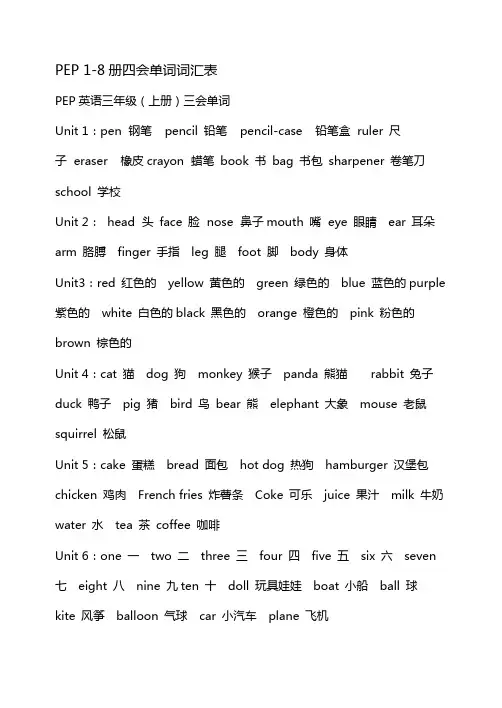
PEP 1-8册四会单词词汇表PEP英语三年级(上册)三会单词Unit 1:pen 钢笔 pencil 铅笔 pencil-case 铅笔盒 ruler 尺子 eraser 橡皮crayon 蜡笔book 书bag 书包sharpener 卷笔刀school 学校Unit 2: head 头face 脸 nose 鼻子mouth 嘴 eye 眼睛ear 耳朵arm 胳膊finger 手指leg 腿foot 脚body 身体Unit3:red 红色的yellow 黄色的green 绿色的blue 蓝色的purple 紫色的white 白色的black 黑色的orange 橙色的pink 粉色的brown 棕色的Unit 4:cat 猫dog 狗monkey 猴子panda 熊猫rabbit 兔子duck 鸭子pig 猪bird 鸟bear 熊elephant 大象mouse 老鼠squirrel 松鼠Unit 5:cake 蛋糕bread 面包hot dog 热狗hamburger 汉堡包chicken 鸡肉French fries 炸薯条Coke 可乐juice 果汁milk 牛奶water 水tea 茶coffee 咖啡Unit 6:one 一two 二three 三four 四five 五six 六seven 七eight 八nine 九ten 十doll 玩具娃娃boat 小船ball 球kite 风筝balloon 气球car 小汽车plane 飞机PEP英语三年级(下册)三会单词Unit 1:boy 男孩girl 女孩teacher 教师student 学生this 这个my 我的friend 朋友I’m=I am 我是nice 好的;愉快的good morning 早上好good afternoon下午好meet 遇见;碰见goodbye 再见too 也;太Unit 2:father 父亲;爸爸dad 爸爸(口语)mother 母亲;妈妈mom 妈妈(口语)man 男人woman女人grandmother (外)祖母grandma (口语)(外)祖母grandfather(外)祖父grandpa (口语)(外)祖父sister 姐妹brother 兄妹let’s=let us 让我们great 太好了really 真地;确切地and 和;并且how 多么;怎么样Unit 3:eleven 十一twelve 十二thirteen 十三fourteen 十四fifteen十五sixteen 十六seventeen 十七eighteen 十八nineteen 十九twenty 二十how many 多少 can 能够;可以look at 看;瞧Unit 4:peach 桃pear 梨orange 橙子watermelon 西瓜apple 苹果banana 香蕉strawberry 草莓grape 葡萄like 喜欢some 一些;某些thanks 多谢Unit 5:bus 公共汽车bike 自行车taxi 出租车jeep 吉普车desk 课桌chair 椅子walkman 随身听lamp 台灯your 你的;你们的zoo 动物园Unit 6:small 小的big 大的long 长的short 短的;矮的tall 高的giraffe 长颈鹿deer 鹿PEP四年级上册四会单词词汇表Unit 1 My classroomwindow board light picture door floor classroom (窗户写字板灯图画门地板教室)computer teacher’s desk wall fan(计算机讲台墙电扇)Unit 2 My schoolbagChinese English math schoolbag story-book notebook bag pencil(语文英语数学书包故事书笔记本书包铅笔)pen book ruler pencil-case twenty thirty forty fifty(钢笔书本尺子铅笔盒二十三十四十五十)Unit 3 My friendslong short hair thin strong quiet music science sports (长的短\矮头发瘦的强壮的文静的音乐科学体育运动)computer game painting teacher student boy girl friend(电脑游戏绘画老师学生男孩女孩朋友)Unit 4 My homestudy bathroom bedroom living room kitchen home room school(书房卫生间卧室起居室(客厅) 厨房家房间学校)classroom desk chair phone bed sofa shelf fridge table(教室课桌椅子电话床沙发书架冰箱桌子)Unit 5 What would you like ?rice fish noodles beef vegetable soup bread milk egg water(米饭鱼面条牛肉蔬菜汤面包牛奶蛋水)chicken fish knife chopsticks spoon plate fork (鸡肉鱼小刀筷子勺子盘子叉子)Unit 6 Meet my familyfamily parents uncle aunt baby sister brother father 家庭父母叔叔;舅舅姨,姑婴儿姐妹兄弟父亲mother driver doctor farmer nurse baseball player母亲司机医生农民护士棒球运动员PEP四年级下册四会单词词汇表Unit 1:computer(计算机) board(写字板) fan(风扇) light(灯) this(这;这个) is(是) my(我的) that(那;那个) your(你的) teacher’s desk(讲台) picture(图画;照片) wall(墙壁) floor(地板) yes(是;是的) it(它)Unit2:one(一) two(二) three(三) four(四) five(五) six(六)seven(七) eig ht(八) nine(九) ten(十) what(什么) time(时间) it’s=it is(它是) …o’clock(…点钟) math(数学) Chinese(语文) English(英语) P.E.(体育) music(音乐) for(为;给) class(课)Unit 3:jacket(夹克衫) shirt(衬衫) skirt(裙子) dress(连衣裙) T-shirt(T 恤衫) red(红色的) blue(蓝色的) yellow(黄色的) green(绿色的) white(白色的) no(不;不是) not(不;不是的) colour(颜色)Unit 4:warm(暖和的) cold(寒冷的) cool(凉爽的) today(今天) jeans(牛仔裤) pants(长裤) socks(袜子) shoes(鞋子) let’s=let us(让我们) play(玩;踢) football(足球) snowy(下雪的) sunny(晴朗的) Unit 5:how much(多少钱) big(大的) small(小的) long(长的) short(短的) apple(苹果) banana(香蕉) pear(梨) orange(橙子) watermelon(西瓜) are(是) they 它(他、她)们Unit 6:horse(马) ar en’t=are not(不是) cat(猫) rabbit(兔子) pig(猪)duck(鸭子) dog(狗) eleven(十一) twelve(十二) thirteen(十三) fifteen(十五) twenty(二十) how many(多少) there(那儿;那里) PEP五年级上册四会单词词汇表Unit 1:young (年轻的) funny(滑稽可笑的)tall (高的)strong (强壮的) kind(和蔼的、亲切的) old(年老的) short(矮的)thin (瘦的) Mr (先生) like(像、喜欢) strict (严格的)smart(聪明的、巧妙的) active (积极的、活跃的) quiet(安静的、文静的)very(很)but (但是)Unit 2:Monday(Mon.)(星期一) Tuesday(Tue.二)Wednesday(Wed.) (星期三) Thursday(Thu.)(星四) Friday(Fri.) (星期五) Saturday(Sat.) (星期六) Sunday(Sun.) (星期天)day (天) have (有、吃) on (在…..时候) do homework (做作业)watch TV (看电视) read books (读书)What about…?(怎么样?) too(也)Unit 3:eggplant (茄子) fish (鱼) green beans (青豆) tofu (豆腐)potato (土豆) tomato (西红柿) for (为) lunch (中餐) we (我们) tasty (好吃的) sweet (甜的) sour (酸的) fresh(新鲜的) salty(咸的) favourite (最喜欢的) they are (他们是)fruit (水果) grape (葡萄)Unit 4:cook the meals (做饭) water the flowers (浇花) sweep the floor (扫地) clean the bedroom (打扫卧室) make the bed (铺床) set the table (摆饭桌)wash the clothes (洗碗碟) do the dishes (收拾衣服) use a computer (使用计算机)Unit 5:curtain (窗帘) trash bin (垃圾箱) closet (壁橱) mirror (镜子) end table (床头柜) bedroom (卧室) kitchen (厨房)bathroom (卫生间) living room (客厅) in (在…里面) on(在…上面) under (在…下面) near (在..旁边) behind (在…后边)clothes (衣服)Unit 6:river(河流) flower(花) grass (草) lake (湖泊) forest (森林) path (路) park (公园) picture (照片) house (房子)bridge (桥) tree (树) road (公路) building (建筑物)clean (干净的)PEP五年级下册四会单词词汇表Unit 1:do morning exercises(晨练) eat breakfast(吃早饭) have English class(上英语课) play sports(进行体育运动) eat dinner(吃晚饭) when(什么时候) evening(夜晚;晚上)get up(起床)at (在……点钟) usually(通常;一般) noon(中午) climb mountains (爬山) go shopping(购物;买东西) play the piano(弹钢琴) visitgrandparents(看望祖父母) go hiking(去远足)weekend(周末) often (经常) sometimes(有时候)Unit 2:spring(春天) summer(夏天) fall(秋天) winter(冬天)season(季节) which(哪一个) best(最;极) swim(游泳) fly kites(放风筝) skate(滑冰;滑冰鞋) make a snowman(堆雪人) plant trees(种树) why(为什么) because(因为) sleep (睡觉)Unit 3:Jan./January(一月) Feb./February(二月) Mar./March(三月)Apr./April(四月) May(五月) June(六月) July(七月)Aug./August(八月) Sept./September(九月) Oct./October(十月)Nov./November(十一月) Dec./December(十二月) birthday(生日)uncle(叔叔;舅舅) her(她的) date(日期)Unit 4:draw pictures(画画)cook dinner(做饭)read a book(看书)answer the phone(接电话) listen to music(听音乐)clean the room (打扫房间)write a letter(写信)write an e-mail(写电子邮件)mom (妈妈)grandpa(爷爷;外公)study(书房)Unit 5:fly(飞) jump(跳) walk(走) run(跑) swim(游泳)kangaroo(袋鼠)sleep(睡觉)climb(往上爬)fight(打架)swing(荡;荡秋千) drink water(喝水)Unit 6:take pictures(照相) watch insects(观察昆虫) pick up leaves (采摘树叶) do an experiment(做实验) catch butterflies(捉蝴蝶) honey(蜂蜜) count insects(数昆虫)collect leaves(收集树叶) write a report(写报告) play chess(下棋) have a picnic(举行野餐)PEP六年级上册四会单词词汇表Unit 1:by (经,乘) foot(脚) bike(自行车) bus(公共汽车) train(火车) how(怎样) go to school(上学)traffic(交通) traffic light(交通灯) traffic rule(交通规则)stop(停,停车站)wait(等待)get to(到达)Unit 2:library(图书馆) post office(邮局) hospital(医院) cinema(电影院) bookstore(书店) where(在哪里,到哪里) please(请) next to(与…相邻) turn(转弯) right (右边) left(左边) straight(成直线地) then(然后) Unit 3:next week(下周) this morning(今天上午) this afternoon(今天下午) this evening (今天晚上) comic book(漫画书) post card(明信片) newspaper(报纸) buy(购买)Unit 4:hobby(爱好) ride a bike--riding a bike(骑自行车)dive--diving(跳水) play the violin—playing the violin(拉小提琴) make kites—making kites(制作风筝) collect stamps—collecting stamps(集邮) live–lives(居住)teach--teaches(教) go--goes(去) watch--watches(看) read--reads(读,看) do-- does doesn’t=does notUnit 5:singer(歌唱家,歌手) writer(作家) actor(男演员) actress(女演员) artist(画家) TV reporter(电视台记者) engineer(工程师) accountant(会计) policeman(男警察) salesperson(销售员) cleaner(清洁工) where(在哪里,到哪里) work(工作)Unit 6:rain(雨) cloud (云) sun(太阳) stream(河,溪) come from(来自,从…来) seed(种子) soil(土壤) sprout (苗,芽) plant(植物,种植) should (应该) then(然后)PEP六年级下册四会单词词汇表Unit 1:tall—taller更高的short—shorter 更矮的strong—stronger 更强壮的 old—older 年龄更大的 young—younger 更年轻的 big—bigger更大的heavy—heavier 更重的 long—longer 更长的 thin—thinner 更瘦的 small—smaller (体型)更小的Unit 2:have a fever 发烧have a sore throat喉咙疼 have a cold感冒have a toothache 牙疼have a headache 头疼matter事情,麻烦 sore 疼的hurt疼痛 nose 鼻子tired疲劳的,累的 excited兴奋的angry生气的 happy高兴的bored无聊的,烦人的sad 忧伤的,悲伤的Unit 3:watch—watched 看 wash—washed 洗clean—cleaned打扫play—played玩 visit—visited 看望do—did last weekend上一个周末 go—went去 go to a park—went to a park 去公园 go swimming—went swimming去游泳 go fishing—went fishing去钓鱼read—read 读go hiking—went hiking 去郊游Unit 4:learn Chinese—learned Chinese学汉语 sing and dance—sang and danced 唱歌和跳舞 eat good food—ate good food 吃好吃的食物take pictures—took pictures 照相 climb mountains—climbed mountains 爬山have—had buy presents—bought presents买礼物 row aboat—rowed a boat 划船 see elephant—saw elephant 看大象go skiing—went skiing 去滑雪 go ice-skating—wentice-skating 去滑冰 how怎么,如何get—got 到达 last上一个的,仅余的,留在最后的小学英语主要句型归类(三年级上册----六年级下册)I询问姓名、年龄。
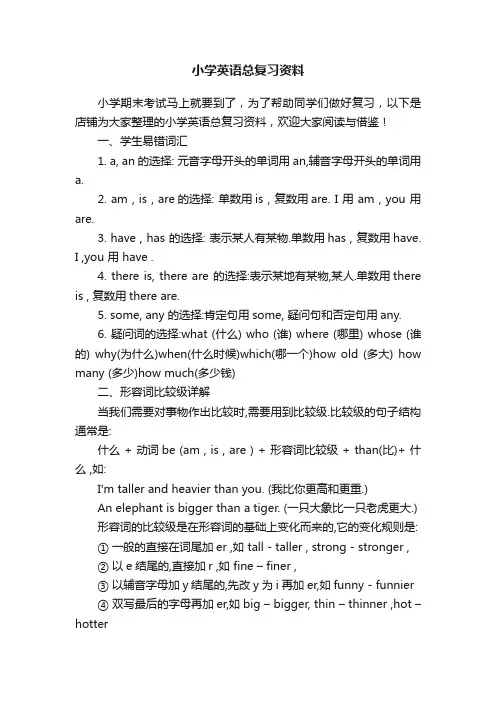
小学英语总复习资料 小学期末考试马上就要到了,为了帮助同学们做好复习,以下是店铺为大家整理的小学英语总复习资料,欢迎大家阅读与借鉴! 一、学生易错词汇 1. a, an的选择: 元音字母开头的单词用an,辅音字母开头的单词用a. 2. am , is , are的选择: 单数用is , 复数用are. I 用 am , you 用 are. 3. have , has 的选择: 表示某人有某物.单数用has , 复数用have. I ,you 用 have . 4. there is, there are 的选择:表示某地有某物,某人.单数用there is , 复数用there are. 5. some, any 的选择:肯定句用some, 疑问句和否定句用any. 6. 疑问词的选择:what (什么) who (谁) where (哪里) whose (谁的) why(为什么)when(什么时候)which(哪一个)how old (多大) how many (多少)how much(多少钱) 二、形容词比较级详解 当我们需要对事物作出比较时,需要用到比较级.比较级的句子结构通常是: 什么 + 动词be (am , is , are ) + 形容词比较级 + than(比)+ 什么 ,如: I'm taller and heavier than you. (我比你更高和更重.) An elephant is bigger than a tiger. (一只大象比一只老虎更大.) 形容词的比较级是在形容词的基础上变化而来的,它的变化规则是: ① 一般的直接在词尾加er ,如 tall - taller , strong - stronger , ② 以e结尾的,直接加r ,如 fine – finer , ③ 以辅音字母加y结尾的,先改y为i再加er,如funny - funnier ④ 双写最后的字母再加er,如big – bigger, thin – thinner ,hot – hotter ☆注意☆ 比较的两者应该是互相对应的可比较的东西. 典型错误:My hair is longer than you.(我的`头发比你更长.) 比较的两者是我的头发,你(整个人),那么比较的对象就没有可比性. 应该改为:My hair is longer than yours. 或My hair is longer than your hair. 比较级专项练习:从方框中选出合适的单词完成句子 heavy tall long big. (1) How is the Yellow River (2) How is Mr Green He's 4375px. (3) How are your feet I wear size 18. (4)How is the fish It's 2kg. 三、动词过去式详解 动词的过去式的构成规则有: A、规则动词 ① 一般直接在动词的后面加ed:如 worked , learned , cleaned , visited ② 以e结尾的动词直接加d:如 lived , danced , used ③ 以辅音字母加y结尾的动词要改y为i再加ed(此类动词较少)如 study – studied carry – carried worry – worried (注意play,stay不是辅音字母加y,所以不属于此类) ④ 双写最后一个字母(此类动词较少)如 stopped B、不规则动词(此类词并无规则,须熟记)小学阶段要记住以下动词的原形和过去式:sing – sang , eat – ate , see – saw , have – had , do – did , go - went , take - took , buy - bought , get - got , read - read ,fly - flew , am/is - was ,are - were , say - said , leave - left , swim - swam , tell - told , draw - drew , come - came , lose - lost , find - found , drink - drank , hurt - hurt , feel - felt 四、动词现在分词详解 动词的ing形式的构成规则: ① 一般的直接在后面加上ing , 如doing , going , working , singing , eating ② 以e 结尾的动词,要先去e再加ing ,如having , writing ③ 双写最后一个字母的(此类动词极少)有:running , swimming , sitting , getting 五、人称代词 一、人称代词 代词的一种,用来直接指代某个(些)人或某个(些)物的代替名词,如:我(们),你(们),她(们),他(们),它(们)等 六、句型专项归类 1、肯定句:是指用肯定的语气来陈述的句子,如:I'm a student. She is a doctor. He works in a hospital. There are four fans in our classroom. He will eat lunch at 12:00. I watched TV yesterday evening. 2、否定句:含有否定词或表示否定意义词的句子,如:I'm not a student. She is not (isn't) a doctor. He does not (doesn't) work in a hospital. There are not (aren't) four fans in our classroom. He will not (won't) eat lunch at 12:00. I did not (didn't) watch TV yesterday evening. ☆注意☆ 小结:否定句主要是在肯定句的基础上加上了否定词 "not".有动词be的句子则"not"加在be后面,可缩写成"isn't,aren't",但am not 一般都分开写.没有动词be的句子则要先在主要动词的前面加上一个助动词(do,does,did),然后在它后面加上"not",你也可以把它们缩写在一起如"don't , doesn't , didn't ).这三个助动词要根据人称和时态来选择,其中"does"只用于一般现在时主语是第三人称单数的情况,而"did"只用于一般过去时,不论主语是什么人称和数,都用"did" . 3、一般疑问句:是指询问事实的句子,此类句子必须用"yes",或"no"来回答. 如:Are you a student Yes, I am / No, I'm not. Is she a doctor Yes, she is. / No, she isn't. Does he work in a hospital Yes, he does. / No, he doesn't. Are there four fans in our classroom Yes, there are. / No, there aren't. Are you going to buy a comic book tonight Yes, I am. / No, I am not. (Yes, we are. / No, we aren't.) Will he eat lunch at 12:00 Yes, I will. / No, I will not(won't). Are they swimming Yes, they are. / No, they aren't. Did you watch TV yesterday evening Yes, I did. / No, I didn't. ☆注意☆ 小结:一般疑问句是在肯定句的基础上. ①把动词be调到首位,其他照写,末尾标点符号变成问号即可. ②没有动词be的句子则要在句首加上一个助动词(do,does,did)再把紧跟在后面的动词变回原形,末尾标点符号变成问号即可. 这三个助动词也要根据人称和时态来选择,其中"does"只用于一般现在时主语是第三人称单数的情况,而"did"只用于一般过去时,不论主语是什么人称和数,都用"did" .一般疑问句有个重要的原则就是问和答要一致,即问句里的第一个单词(助动词)和简略答句里的这个词是一致的. 4、特殊疑问句:以特殊疑问词(what , where , who , which , when , whose , why , how等)开头引导的句子.此类句子应该问什么就答什么,不能用"yes ,no"来回答.如: What is this It's a computer. What does he do He's a doctor. Where are you going I'm going to Beijing. Who played football with you yesterday afternoon Mike. Which season do you like best Summer. When do you usually get up I usually get up at 6:30. Whose skirt is this It's Amy's. Why do you like spring best Because I can plant trees. How are you I'm fine. / I'm happy.
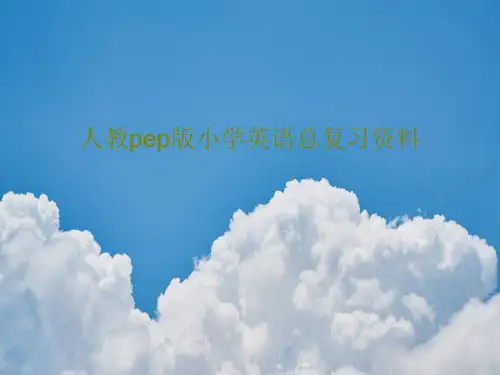
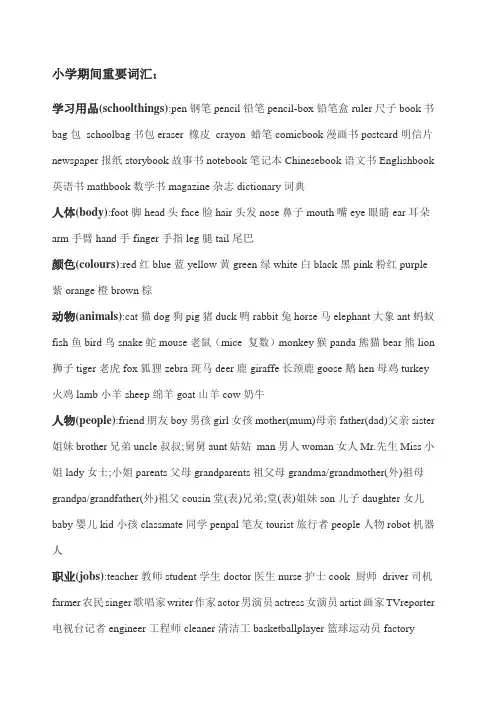
小学期间重要词汇:学习用品(schoolthings):pen钢笔pencil铅笔pencil-box铅笔盒ruler尺子book书bag包schoolbag书包eraser 橡皮crayon 蜡笔comicbook漫画书postcard明信片newspaper报纸storybook故事书notebook笔记本Chinesebook语文书Englishbook 英语书mathbook数学书magazine杂志dictionary词典人体(body):foot脚head头face脸hair头发nose鼻子mouth嘴eye眼睛ear耳朵arm手臂hand手finger手指leg腿tail尾巴颜色(colours):red红blue蓝yellow黄green绿white白black黑pink粉红purple 紫orange橙brown棕动物(animals):cat猫dog狗pig猪duck鸭rabbit兔horse马elephant大象ant蚂蚁fish鱼bird鸟snake蛇mouse老鼠(mice 复数)monkey猴panda熊猫bear熊lion 狮子tiger老虎fox狐狸zebra斑马deer鹿giraffe长颈鹿goose鹅hen母鸡turkey 火鸡lamb小羊sheep绵羊goat山羊cow奶牛人物(people):friend朋友boy男孩girl女孩mother(mum)母亲father(dad)父亲sister 姐妹brother兄弟uncle叔叔;舅舅aunt姑姑man男人woman女人Mr.先生Miss小姐lady女士;小姐parents父母grandparents祖父母grandma/grandmother(外)祖母grandpa/grandfather(外)祖父cousin堂(表)兄弟;堂(表)姐妹son儿子daughter女儿baby婴儿kid小孩classmate同学penpal笔友tourist旅行者people人物robot机器人职业(jobs):teacher教师student学生doctor医生nurse护士cook 厨师driver司机farmer农民singer歌唱家writer作家actor男演员actress女演员artist画家TVreporter 电视台记者engineer工程师cleaner清洁工basketballplayer篮球运动员factoryworker 工厂工人postman 邮递员businessman 商人post officer 警察fisherman 渔民scientist 科学家pilot 飞行员coach 教练食品,饮料(food&drink):rice米饭bread面包beef牛肉milk牛奶water水egg蛋fish鱼tofu豆腐cake蛋糕hotdog热狗hamburger汉堡包Frenchfries炸薯条cookie 曲奇biscuit饼干jam果酱noodles面条meat肉chicken鸡肉pork猪肉mutton羊肉vegetable蔬菜salad沙拉sandwich 三明治soup汤ice冰ice cream冰淇淋Coke可乐juice果汁tea茶coffee咖啡breakfast早餐lunch午餐dinner/supper晚餐meal一餐水果,蔬菜(fruit&vegetables):apple苹果banana香蕉pear梨orange橙watermelon 西瓜grape葡萄eggplant茄子greenbeans青豆tomato西红柿potato土豆peach桃strawberry草莓onion洋葱carrot胡萝卜cabbage卷心菜衣服(clothes):jacket夹克衫shirt衬衫T-shirt丅恤衫skirt短裙子dress连衣裙jeans 牛仔裤pants长裤socks袜子shoes鞋子sweater毛衣coat上衣shorts短裤hat(有沿的)帽子cap便帽sunglasses太阳镜tie领带scarf围巾gloves手套umbrella 雨伞cloth布交通工具(vehicles):bike自行车bus公共汽车train火车boat小船ship轮船car小汽车taxi出租车plane飞机subway地铁on foot 步行杂物(otherthings):window窗户door门desk课桌chair椅子bed床computer计算机blackboard黑板fan风扇light灯teacher'sdesk讲台picture图画;照片wall墙壁floor 地板football/soccer足球phone电话sofa沙发fridge冰箱table桌子TV电视key钥匙photo照片plate 盘子bowl碗knife刀fork叉spoon勺子chopsticks筷子gift礼物toy玩具key 钥匙map地图ball球balloon气球kite风筝box盒子umbrella伞violin小提琴menu菜单e-mail电子邮件trafficlight交通灯money钱medicine药地点(locations):home家room房间bedroom卧室bathroom卫生间livingroom起居室kitchen厨房classroom教室school学校park公园library图书馆postoffice邮局policeoffice警察局hospital医院cinema电影院bookstore书店farm农场zoo动物园garden花园study书房playground操场dining hall 食堂,饭厅teacher'soffice教师办公室library图书馆gym体育馆bathroom卫生间artroom绘画教室computerroom计算机教室musicroom音乐教室TVroom电视机房company公司factory工厂petshop宠物商店naturepark自然公园themepark主题公园sciencemuseum科学博物馆theGreatWall长城supermarket超市restaurant餐馆bank 银行country国家village乡村city城市hometown家乡busstop公交车站课程(classes):Chinese class语文math class数学PE class体育课English class英语课music class 音乐课art class 美术课国家,城市(countries&cities):China中国America/USA美国UK联合王国England 英国Canada加拿大Australia澳大利亚NewYork纽约London伦敦Sydney悉尼Moscow莫斯科气象天气(weather):cold寒冷的warm温暖的cool凉爽的hot 热的snowy下雪的sunny晴朗的rainy下雨的windy有风的cloudy多云的weatherreport天气预报景物(nature):river河流lake湖泊forest森林road公路house房子bridge桥building 建筑物rain雨cloud云sun太阳mountain山hill 小山sky天空rainbow彩虹wind 风air空气moon月亮植物(plants):flower花grass草tree树plant植物rose玫瑰leaf叶子星期(week):Monday星期一Tuesday星期二Wednesday星期三Thursday星期四Friday星期五Saturday星期六Sunday星期天weekend周末月份(months):Jan.(January)一月Feb.(February)二月Mar.(March)三月April四月May五月June六月July七月Aug.(August)八月Sept.(September)九月Oct.(October)十月Nov.(November)十一月Dec.(December)十二月季节(seasons):spring春summer夏fall/autumn秋winter冬方位(directions):south南north北east东west西turn left(at)左边turn right(at)右边go straight 直走患病(illness):haveafever发烧hurt疼痛haveacold感冒数词(numbers):one一two二three三four四five五six六seven七eight八nine 九ten十eleven十一twelve十二thirteen十三fourteen十四fifteen十五sixteen十六seventeen十七eighteen十八nineteen十九twenty二十thirty三十forty四十fifty五十sixty六十seventy七十eighty八十ninety九十forty-two四十二hundred百one/ahundredandthirty-six一百三十六first第一second第二third第三fourth第四fifth第五eighth第八ninth第九twelfth 第十二twentieth第二十thirtieth第三十形容词(adj.):big大的small小的long长的tall高的short短的;矮的young年轻的old旧的;老的strong健壮的friendly 有好的thin瘦的fat胖的active积极活跃的quiet安静的nice好看的kind和蔼亲切的polite 有礼貌的hard-working 工作努力的shy 害羞的strict严格的clever聪明的funny滑稽可笑的tasty好吃的sweet甜的salty咸的sour酸的fresh新鲜的hot 辣的delicious 美味的favourite最喜爱的clean干净的tired疲劳的angry生气的happy高兴的sad忧愁的good好的fine好的great很好的heavy重的new新的happy快乐的right对的hungry饥饿的thirsty 渴的cute逗人喜爱的little小的lovely可爱的beautiful漂亮的colourful色彩鲜艳的pretty漂亮的cheap便宜的expensive昂贵的juicy多汁的tender嫩的healthy健康的ill有病的helpful有帮助的high高的easy简单的proud骄傲的taller更高的shorter更矮的stronger更强壮的older年龄更大的younger更年轻的bigger更大的heavier更重的longer更长的thinner更瘦的smaller更小的better更好的(good 和well 的比较急higher更高的介词(prep.):in在……里on在……上;在……时候under在……下面near在……的旁边behind在……后边nextto与……相邻over在……上面infrontof在……前面above 在……上面between 在……中间beside 在旁边动词(v.):get(gets, got) up 起床go(goes, went) to school去上学go home 回家go to bed 上床睡觉wash( washes, washed)my clothes 洗我的衣服watch( watches, watched)TV 看电视do(does, did) homework 做作业read(reads, read) books 看书play( plays, played)踢足球play basketball 打篮球play ping-pong 打乒乓球play badmiton 打羽毛球play the pipa 弹琵琶do kungfu 练功夫draw(draws, drew) cartoons 画漫画cook(cooks, cooked)烹饪swim( swims, swam) go swimming 游泳speak(speaks, spoke) English 说英语eat(eats, ate) breakfast 吃早饭have(has, had)…class 上……课play sports 进行体育运动do morning exercises 做早操eat dinner 吃晚饭clean(cleans, cleaned) my room 打扫我的房间go for a walk 散步go shopping 去购物take(takes, took) a dancing class 上舞蹈课go on a picnic 去野餐pick(picks, picked) apples 摘苹果make(makes, made) a snowman 堆雪人turn(turns, turned) left 向左转turn right 向右转slow down 慢下来stop(stops,stopped)停下visit(visits, visited) my grandparents 拜访我的外祖父母see(sees, saw) a film 看电影take a trip 去旅行go to the supermarket 去超市cook Chineses food 做中国菜study(studies, studied) Chinese 学习中文do word puzzles 猜字谜go hiking 去远足see a doctor 看医生do more exercise 做更多的锻炼wear(wears, wore) warm clothes 穿厚点take a deep breath 深呼吸count to ten 数到十stay(stays, stayed) at home 待在家have a cold 感冒sleep(sleeps, slept) 睡觉go camping 野营go fishing 去钓鱼ride(rides, rode) a horse 骑马hurt(hurts, hurt) my foot 伤了脚take pictures 照相buy(buys, bought) gifts 买礼物go cycling 骑自行车ice-skate = go ice-skating =go skating 滑冰小学期间重要句型特殊疑问句Where are you from 你是哪里人I’m from the UK. 我是英国人。
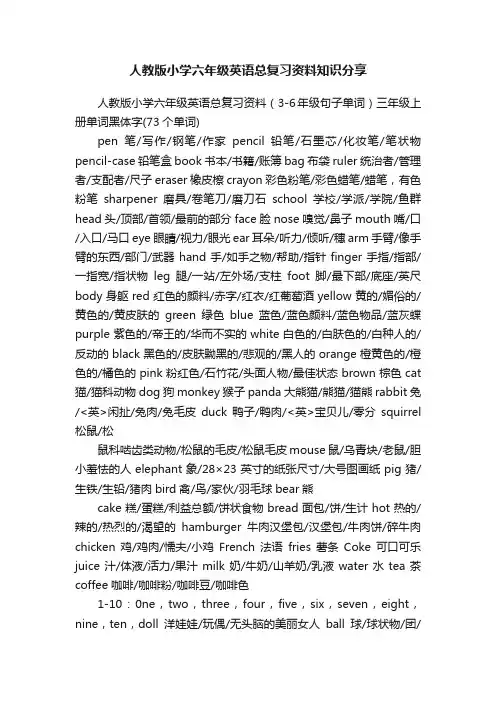
人教版小学六年级英语总复习资料知识分享人教版小学六年级英语总复习资料(3-6年级句子单词)三年级上册单词黑体字(73个单词)pen笔/写作/钢笔/作家pencil铅笔/石墨芯/化妆笔/笔状物pencil-case 铅笔盒book书本/书籍/账簿bag布袋ruler统治者/管理者/支配者/尺子eraser橡皮檫crayon彩色粉笔/彩色蜡笔/蜡笔,有色粉笔sharpener磨具/卷笔刀/磨刀石school学校/学派/学院/鱼群head头/顶部/首领/最前的部分face脸nose嗅觉/鼻子mouth嘴/口/入口/马口eye眼睛/视力/眼光ear耳朵/听力/倾听/穗arm手臂/像手臂的东西/部门/武器hand手/如手之物/帮助/指针finger手指/指部/一指宽/指状物leg腿/一站/左外场/支柱foot脚/最下部/底座/英尺body身躯red红色的颜料/赤字/红衣/红葡萄酒yellow黄的/媚俗的/黄色的/黄皮肤的green绿色blue蓝色/蓝色颜料/蓝色物品/蓝灰蝶purple紫色的/帝王的/华而不实的white白色的/白肤色的/白种人的/反动的black黑色的/皮肤黝黑的/悲观的/黑人的orange橙黄色的/橙色的/橘色的pink粉红色/石竹花/头面人物/最佳状态brown棕色cat 猫/猫科动物dog狗monkey猴子panda大熊猫/熊猫/猫熊rabbit兔/<英>闲扯/兔肉/兔毛皮duck鸭子/鸭肉/<英>宝贝儿/零分squirrel 松鼠/松鼠科啮齿类动物/松鼠的毛皮/松鼠毛皮mouse鼠/乌青块/老鼠/胆小羞怯的人elephant象/28×23英寸的纸张尺寸/大号图画纸pig猪/生铁/生铅/猪肉bird禽/鸟/家伙/羽毛球bear熊cake糕/蛋糕/利益总额/饼状食物bread面包/饼/生计hot热的/辣的/热烈的/渴望的hamburger牛肉汉堡包/汉堡包/牛肉饼/碎牛肉chicken鸡/鸡肉/懦夫/小鸡French法语fries薯条Coke可口可乐juice汁/体液/活力/果汁milk奶/牛奶/山羊奶/乳液water水tea茶coffee咖啡/咖啡粉/咖啡豆/咖啡色1-10:0ne,two,three,four,five,six,seven,eight,nine,ten,doll洋娃娃/玩偶/无头脑的美丽女人ball球/球状物/团/舞会boat小船/帆船/调味汁盆/轮船kite风筝balloon鼓起/膨胀如气球/<英>被踢得腾空飞起/迅速增多car汽车/火车车厢/货车/梯厢plane平面/水平/虚构平面/飞机三年级下册单词黑体字(72个单词、词组)boy男孩/男青年/男人/儿子girl女孩teacher教师/导师student 学生/<北美>学生/学员/学者this这,这个my我的friend朋友/赞助者/同志/助手nice好的,漂亮的goodmorning早上好Goodafternoon下午好meet遇见/与…会面/满足/符合goodbye分别too也/太I’m=I am father/dad 父亲/爸爸/神父 mother/mom妈妈 man男子/人/男人/人类woman女人grandmother/grandma祖母/女祖先grandfather/grandpa祖父/创办者/始祖sister姐妹/亲密女友/修女/护士brother兄弟let’s=let us让我们really真正地/实际上/十分/全然great极大的/强烈的/了不起的/伟大的and和/并且/然后/而且how 怎样/如何/多少/多么11-20:eleven,twelve,thirteen,fourteen,fifteen,sixteen,seventeen,eighteen,nineteen,twenty,many许多/许多人can能,会,可以look看/朝向/注意/看上去像at 在… peach桃子/桃树/桃红色pear梨/梨树/梨子orange橘子watermelon西瓜/西瓜秧apple苹果banana香蕉grape葡萄strawberry草莓like喜欢/希望/想要/情愿some一些人/一些/若干/其中的一部分thanks感谢,感恩bus公共汽车bike自行车/摩托车/脚踏车taxi缓慢滑行/乘出租车/驾驶飞机缓慢滑行/滑行jeep吉普车desk书桌/服务台chair 椅子/会议主持人/主席/讲座walkman随身听lamp电灯your你的/你们的/荣誉是…的你zoo动物园/混乱状态small 小的/低的/幼年的/不重要的big大的long长间隔/长期资本/长时间的short短的,矮的tall高的/不可能的/长的/过分的giraffe长颈鹿deer鹿四年级上册单词黑体字(66个单词、词组)window窗户/窗状开口/金属箔片/窗board长而薄的木板/委员会/膳食/甲板light光/光线/灯/浅色picture画/照片/画像/景色door门floor地面/发言席/楼层/基底classroom教室computer计算机/计算者/电脑/电子计算机wall围墙/墙壁/峭立面/屏障fan扇风/扩散/煽动/吹拂teacher’s desk教师办公桌Chinese book中文书English book 英语书math book数学书school bag书包story-book故事书note book笔记本twenty-one21 thirty30 thirty-one31 forty40 forty-one fifty50 long hair长头发short hair短头发thin瘦的strong强壮quiet安静的/秘密的/不动的/温顺的friend(s)朋友music音乐science 科学sports体育computergame 电脑游戏painting绘画study书房/学习/课题bathroom浴室bedroom卧室living活的/居住的/现存的/逼真的living room 客厅kitchen厨房phone电话/耳机/听筒bed床sofa沙发shelf架子/搁板/大陆架/暗礁fridge<非正式>电冰箱/冰柜/冷藏库table桌子/列表/表格/平面rice米饭fish鱼noodles面条beef 牛肉vegetable蔬菜soup汤/羹/马力knife小刀chopsticks筷子spoon 汤匙/调羹状物品/匙形桨叶/一杓的量plate盘子/平板/金属板/感光底片fork叉family家/家族/家庭parents父母uncle叔父/伯父/姨夫/姑父aunt伯母/阿姨/姑妈/舅妈baby婴儿/胆小的人/幼稚的人/孩子气的人driver司机/传动装置/驱动力/驱动程序doctor医生farmer农场主/<史>租税包收人/农夫nurse护士baseball player棒球运动员四会单词(36个)bag,pencil,pen,book,ruler,pencil-case,teacher,student,boy,girl,friend,home,room,school,classroom,window,desk,door,chair,bed,rice,beef,bread,milk,egg鸡蛋water,chicken,fish,sister,brother,father,mother,driver,doctor,farmer,nurse,四年级下册单词黑体词(50个单词、词组)playground运动场/游乐场/活动场所garden花园/菜园/果园/<北美>公共大厅teacher’s desk, canteen食堂/<英>餐具箱/小水壶/水壶art艺术/文艺/文科/技巧room空间/地盘/房间/余地computer,room washroom<北美>盥洗室 / 厕所 / 洗手间 music room gym体操馆 / 健身房 / 体育 / 体育馆 TV电视 room lunch午餐English class英语课 music class音乐课 breakfast早餐dinner晚餐P.E. class体育课 get up起床go to school去学校go home回家 go to bed去睡觉 sweater针织套衫/<旧>榨取雇员血汗的雇主/毛线衣/大量出汗的人jeans牛仔裤pants短裤socks 袜子shoes鞋shorts短裤hot weather天气rainy多雨的/下雨的windy风大的/<英>肠胃气胀的/腹胀的/吹牛的cloudy多云的/混浊的/阴天的/愁容满面的colourful五彩缤纷的pretty漂亮的/标致的/悦耳的/可爱的cheap便宜的expensive贵的sneakers运动鞋slippers拖鞋sandals凉鞋boots靴子sheep羊hen母鸡lamb小绵羊/羔羊/羔羊肉/<喻>温顺goat山羊cow奶牛tomato番茄cucumber黄瓜potato土豆onion洋葱carrot胡萝卜四会单词(88个)computer,board,fan,light,this,is,my,that,your,teacher’sdesk,picture,wall,floor,yes,itone,two,three,four,five,six,seven,eight,nine,ten,what什么/那样的事/多少/多么time时间/时代/次数it’s,o’clock点钟math,Chinese,English,P.E.,music,for,class,jacket短上衣/羽绒滑雪衫/书籍的护封/西装短外套/夹克shirt衬衫/英式橄榄球衬衣/<英>运动队队员/汗衫skirt裙子/多筋动物肉/下摆/女人dress连衣裙T-shirtT恤/短袖圆领汗衫red,blue,yellow,green,white,no,not没有/不算/不到/表示否定colour给…着色/影响/扭曲/使脸红/颜色warm温暖的cold 冷的cool凉爽的/冷静的/出色的today今天jeans,pant,socks,shoes,let’splay玩耍/参加/扮演/演奏football足球运动/橄榄球snowy下雪的sunny晴朗的how,much,big,small,long,short,apple,banana,pear,orange,watermelon,are,they他们/她们/它们 / 人们 horse马 / 支架 / 骑兵 /脚架aren’t,cat,rabbit,pig,duck,dog,eleven,twelve,thirteen,fifteen,twenty,how,many,there,五年级上册单词黑体字(16个单词、词组)principal首要的/主要的/本金的/资本的university大学/综合性大学/大学校舍student cabbage卷心菜/卷心菜叶子pork猪肉/政治分肥mutton羊肉empty空的/无意义的/无知的/徒劳的 the trash废物,垃圾put away收起 the clothes衣服 air-conditioner空调 over 通过/再一次/结束/越过in front of在前面 sky天空cloud云/<喻>阴影/疑团/麻烦 mountain大山village村寨city城市四会单词、词组(93个)young幼小的/初期的/年轻的/没有经验的funny滑稽的/诙谐的/难以解释的/奇怪的tall,strong,kind类old年老的short,thin,who’s=who is ,Mr先生what’s=what is ,like ,he’s=he is ,strict严格smart聪明active积极的quiet,she’s=she is ,very 非常but 但是星期一到星期天:Monday,Tuesday,Wednesday,Thursday,Friday,Saturday,Sunday,day天,日have有 on ,do homework做作业watch TV看电视 read books读书What about…?那…呢? Too,eggplant茄子 fish , green beans绿豆 tofu豆腐potato,tomato,for,lunch,we,tasty可口的/使人动心的/美味的/高雅的sweet 甜sour酸fresh新鲜salty含盐的/咸的/用盐腌的/粗俗的favourite最喜欢的/ 特别受喜爱的they’re=they are ,fruit 水果don’t=do not ,grape葡萄cook烹调the meals三餐water,the flowers花sweep the floor扫地clean the bedroom打扫卧室make the bed铺床set the table摆好桌子wash the clothes 洗衣服do the dishes洗碗can’t=can notuse a computer用电脑curtain窗帘trash bin垃圾箱closet衣橱 / 壁橱 / 议事室,密室 / 小房间 mirror镜子end最后部分 / 端 / 尽头 / 结束table, bedroom, kitchen,bathroom, living room,in在…里 on在上面 / 继续着 / 上演/ 开着的under在…底部/ 在…下面/ 受制于/ 低于near接近 behind在后面 clothes , river江,河flowergrass草类植物/草/草地lake湖forest森林path小径/路线/途径/道路park公园picture , house, bridge桥tree树木road 公路building建筑clean清洁的/清白的/纯洁的/天真的五年级下册单词黑体字(18个)1-12月:January,February,March,April,May,June,July,August,September,October,November,December第一到第五:first首先/最早/第一/首要的second,third,fourth,fifth,Eighth第八ninth第九twelfth第十二twentieth第二十四会单词、词组(83个)do morning exercises做早操 eat breakfast吃早餐have English class有英语课 play sports做运动eat dinner吃晚餐 when 何时 evening 晚上 get up 起床at usually通常 noon中午 climb mountains 爬山 go shopping 去购物play the piano弹钢琴visit grandparents看望祖父母go hiking去远足weekend周末often经常/常常sometimes有时spring 春天summer夏天fall下落/摔倒/来临/减弱winter冬天season 季节which哪一个best最好的swim游泳fly kites放风筝 skate滑冰 make a snowman堆雪人plant trees植树 why 为什么 because因为 sleep睡觉1-12月:Jan.,Feb.,Mar.,Apr,.May,June,July,Aug,.Sept.,Oct,.Nov,.Dec.,birthday生日uncleher她的date日期/约会draw pictures画画 cook dinner做饭 read a book 读书 answer the phone接电话 listen to music听音乐 clean the roomwrite a letter写信write an e-mail写邮件mom grandpa study fly飞/ 被快速投掷/ 驾驶飞机/ 飘扬jump跳跃/ 惊跳/ 障碍/ 跳伞walk步行run跑步swim kangaroo 袋鼠sleep睡觉 climb爬 fight打架 / 争论 / 与…打仗 /反对…提案 swing秋千 drink喝 water take pictures拍照watch insects观察昆虫 pick up leaves拾起树叶do an experiment做实验catch butterflies捉蝴蝶honey count insects蜜蜂collect leaves收集树叶write a report 写报告 play chess下棋 have a picnic野餐六年级上册单词黑体字(16个)plane平面/水平/虚构平面/飞机ship船舶subway<英>地下通道/<北美>地铁/地道sciencemuseum科学博物馆north北方的south 南方的east东方的west西方的tonight今晚tomorrow明天take a trip去旅行 read a magazine 读杂志 go to the cinema 去看电影magazine杂志社 dictionary 字典 vapour汽体四会单词、词组(71个)by,foot,bike,bus,train火车/车队/导火线/行列how,gotoschool,traffic交通 traffic light交通灯,交通灯 traffic rule交通规则 stop停止wait等待get to library到图书馆 post office 邮局hospital医院cinema电影院bookstore书店where哪里please请求nest巢to, turn right右转 left左边的 straight 直接的,笔直的then然后 next week 下周 this morning今早this afternoon今下午this evening今晚 comic book漫画书post card明信片newspaper 新闻buy购买hobby喜好ride a bike骑自行车 dive潜水 play the violin拉小提琴make kites做风筝collect stamps集邮live(s)生活teach(es)教go(es)去watch(es)看read(s)读does做doesn’t=does not,singer歌手writer作家actor演员actress女演员artist画家TV reporter电视记者engineer 工程师accountant会计policeman警察salesperson销售员cleaner 干洗店/清洁剂/清洁工/洗洁器where,work工作rain雨天,cloud 阴天sun晴天stream溪流seed种子/种子选手/种萌芽come来/进入/发生/开始from从…起/来自/由于/今后soil土壤sprout发芽plant 种should应不应该then六年级下册单词四会单词(25个)比较级更..:taller更高shorter,stronger,older,younger,bigger,heavier沉重/浓厚的/繁重的/阴沉的longer,thinner,smaller,have a fever发烧hurt 受伤have a cold感冒have a toothache牙疼have a headache头痛have a sore throat喉咙痛matter物质/事情/问题/事件sore疼痛的/生气的nose,tired疲劳的(累的)/厌倦的/不新鲜的/陈腐的excited兴奋的,激动的angry愤怒的/<喻>怒吼的/红肿发炎的happy开心的bored无聊的sad伤心的三年级上册句子读下列句子,写出中文意思.1. Hello! ___________Hi! _____________________________2. Hello! I’m Wu Yifan. I’m from China.__________________________ 3What’s your name?_______________________________________4. My name’s Chen Jie. ______________________________________5. I have a pencil. ____________________ Metoo._________________6. Good morning._______________ Good afternoon._______________7. This is Miss White. _____________Nice to meet you. ____________8. Where are you from? ____________I’m from America.___________9. Let’s go to school. __________________ OK._______10. How many cakes? ____________________One cake.__________11.How are you? ________________I’m fine, thank you._____________12. Let’s paint. _________________Great.________________________13. I like green._________________Me too. ______________________14. I have a rabbit.___________________________________________15. Cool! ________ Super!_________ Great!________Wow!_________16. May I have a look? ___________________Sure._________________17. Here you are. _________Thank you. __________You’re welcome18. I like hamburgers._______________Me too. ___________________19. Have some French fries.____________________________________20. Can I have some chicken? ____________________ Sure. __________21. How old are you? ____________________I’m nine. ____________三年级下册句子1. Where are you from?I’m from America.2. Good morning! Good afternoon!3. Class, we have a new friend today.4. Who’s that woman?She’s my mother。
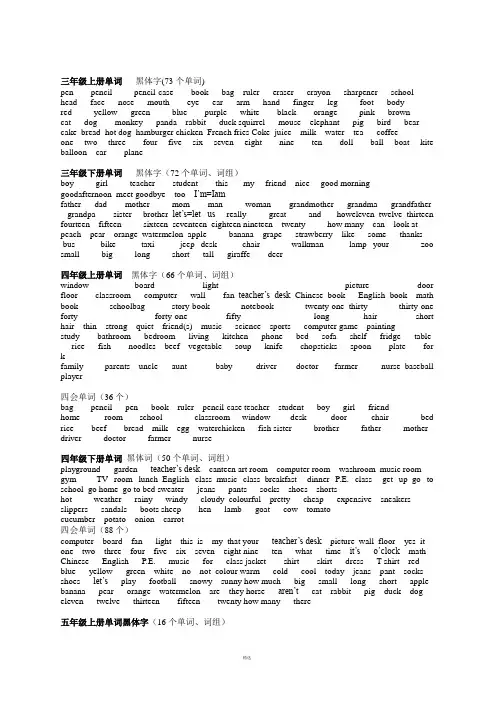
三年级上册单词黑体字(73个单词)pen pencil pencil-case book bag ruler eraser crayon sharpener school head face nose mouth eye ear arm hand finger leg foot bodyred yellow green blue purple white black orange pink browncat dog monkey panda rabbit duck squirrel mouse elephant pig bird bear cake bread hot dog hamburger chicken French fries Coke juice milk water tea coffeeone two three four five six seven eight nine ten doll ball boat kite balloon car plane三年级下册单词黑体字(72个单词、词组)boy girl teacher student this my friend nice good morning goodafternoon meet goodbye too I’m=Iamfather dad mother mom man woman grandmother grandma grandfather grandpa sister brother let’s=let us really great and howeleven twelve thirteen fourteen fifteen sixteen seventeen eighteen nineteen twenty how many can look at peach pear orange watermelon apple banana grape strawberry like some thanks bus bike taxi jeep desk chair walkman lamp your zoo small big long short tall giraffe deer四年级上册单词黑体字(66个单词、词组)window board light picture door floor classroom computer wall fan teacher’s desk Chinese book English book math book schoolbag story-book notebook twenty-one thirty thirty-one forty forty-one fifty long hair short hair thin strong quiet friend(s) music science sports computer game paintingstudy bathroom bedroom living kitchen phone bed sofa shelf fridge table rice fish noodles beef vegetable soup knife chopsticks spoon plate for kfamily parents uncle aunt baby driver doctor farmer nurse baseball player四会单词(36个)bag pencil pen book ruler pencil-case teacher student boy girl friendhome room school classroom window desk door chair bed rice beef bread milk egg waterchicken fish sister brother father mother driver doctor farmer nurse四年级下册单词黑体词(50个单词、词组)playground garden teacher’s desk canteen art room computer room washroom music room gym TV room lunch English class music class breakfast dinner P.E. class get up go to school go home go to bed sweater jeans pants socks shoes shortshot weather rainy windy cloudy colourful pretty cheap expensive sneakers slippers sandals boots sheep hen lamb goat cow tomatocucumber potato onion carrot四会单词(88个)computer board fan light this is my that your teacher’s desk picture wall floor yes it one two three four five six seven eight nine ten what time it’s o’clock math Chinese English P.E. music for class jacket shirt skirt dress T-shirt red blue yellow green white no not colour warm cold cool today jeans pant socks shoes let’s play football snowy sunny how much big small long short apple banana pear orange watermelon are they horse aren’t cat rabbit pig duck dog eleven twelve thirteen fifteen twenty how many there五年级上册单词黑体字(16个单词、词组)principal university student cabbage pork mutton empty the trash put away the clothes air-conditioner over in front of sky cloud mountain village city四会单词、词组(93个)young funny tall strong kind old short thin who’s=who is Mr what’s=what i s like he’s=he is strict smart active quiet she’s=she is very but Monday Tuesday Wednesday Thursday Friday day have on Saturday Sunday do homework watch TV read books What about…? too eggplant fish green beans tofu potato tomato for lunch we tasty sweet sour fresh salty favourite they’re=they are fruit don’t=do not grape cook the meals water the flowers sweep the floor clean the bedroom make the bed set the table wash the clothes do the dishescan’t=cannot use a computer curtain trash bin closet mirror end table bedroom kitchen bathroom living room in on under near behind clothes river flower grass lake forest path park picture house bridge tree road building clean五年级下册单词黑体字(18个)January February March April May June July August September October November December first second third fourth fifth Eighth ninth twelfth twentieth四会单词、词组(83个)do morning exercises eat breakfast have English class play sports eat dinner when eveningget up at usually noon climb mountains go shopping play the piano visit grandparentsgo hiking weekend often sometimes spring summer fall winter season which best swimfly kites skate make a snowman plant trees why because sleep Jan. Feb. Mar. Apr. May June July Aug. Sept. Oct. Nov. Dec. birthday uncle her datedraw pictures cook dinner read a book answer the phone listen to music clean the roomwrite a letter write an e-mail mom grandpa study fly jump walk run swim kangaroo sleep climb fight swing drink water take pictures watch insects pick up leavesdo an experiment catch butterflies honey count insects collect leaves write a reportplay chess have a picnic六年级上册单词黑体字(16个)plane ship subway science museum north south east west tonight tomorrowtake a trip read a magazine go to the cinema magazine dictionary vapour四会单词、词组(71个)by foot bike bus train how go to school traffic traffic light traffic rule stop wait get to library post office hospital cinema bookstore where please nest to turn right left straight then next week this morning this afternoon this evening comic book post card newspaper buy hobby ride a bike dive play the violin make kites collect stamps live(s) teach(es) go(es) watch(es)read(s) does doesn’t=does not singer writer actor actressartist TV reporter engineer accountant policeman salesperson cleaner where work raincloud sun stream seed come from soil sprout plant should then六年级下册单词四会单词(25个)taller shorter stronger older younger bigger heavier longer thinner smaller have a fever hurt have a cold have a toothache have a headache have a sore throat matter sore nose tired excited angry happy bored sad三年级上册句子读下列句子,写出中文意思.1. Hello! ___________ Hi! _____________________________2. Hello! I’m Wu Yifan. I’m from China.__________________________3. What’s your name?_______________________________________4. My name’s Chen Jie. ______________________________________5. I have a pencil. ____________________ Me too._________________6. Good morning._______________ Good afternoon._______________7. This is Miss White. _____________Nice to meet you. ____________8. Where are you from? ____________ I’m from America.___________9. Let’s go to school. __________________ OK.________10. . How many cakes? ____________________One cake.__________11. How are you? ________________I’m fine, thank you._____________12. Let’s paint. _________________ Great.________________________13. I like green._________________ Me too. ______________________14. I have a rabbit. ___________________________________________15. Cool! ________ Super!_________ Great!________ Wow!_________16. May I have a look? ___________________Sure. _________________17. Here you are. _________Thank you. __________You’re welcome18. I like hamburgers._______________ Me too. ___________________19. Have some French fries. ____________________________________20. Can I have some chicken? ____________________Sure. __________21. How old are you? ____________________ I’m nine. ____________三年级下册句子1. Where are you from? I’m from America.2. Good morning! Good afternoon!3. Class, we have a new friend today.4. Who’s that woman?She’s my mother。
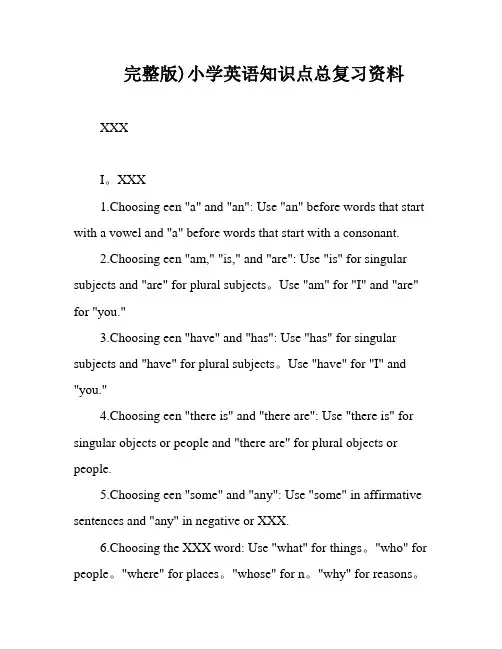
完整版)小学英语知识点总复习资料XXXI。
XXX1.Choosing een "a" and "an": Use "an" before words that start with a vowel and "a" before words that start with a consonant.2.Choosing een "am," "is," and "are": Use "is" for singular subjects and "are" for plural subjects。
Use "am" for "I" and "are" for "you."3.Choosing een "have" and "has": Use "has" for singular subjects and "have" for plural subjects。
Use "have" for "I" and "you."4.Choosing een "there is" and "there are": Use "there is" for singular objects or people and "there are" for plural objects or people.5.Choosing een "some" and "any": Use "some" in affirmative sentences and "any" in negative or XXX.6.Choosing the XXX word: Use "what" for things。
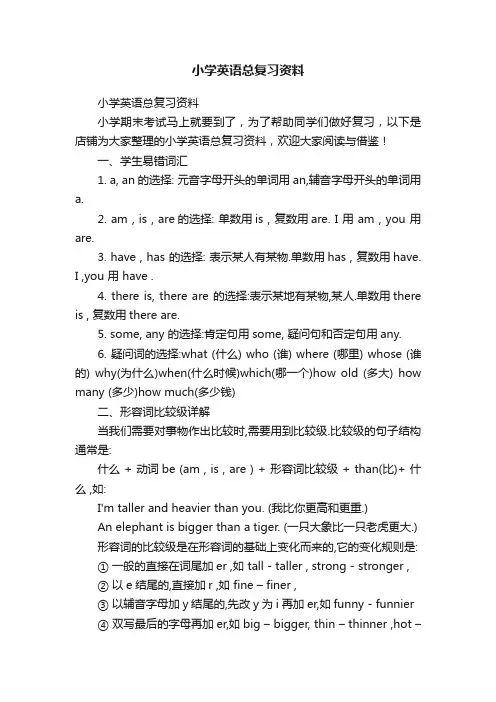
小学英语总复习资料小学英语总复习资料小学期末考试马上就要到了,为了帮助同学们做好复习,以下是店铺为大家整理的小学英语总复习资料,欢迎大家阅读与借鉴!一、学生易错词汇1. a, an的选择: 元音字母开头的单词用an,辅音字母开头的单词用a.2. am , is , are的选择: 单数用is , 复数用are. I 用 am , you 用are.3. have , has 的选择: 表示某人有某物.单数用has , 复数用have.I ,you 用 have .4. there is, there are 的选择:表示某地有某物,某人.单数用there is , 复数用there are.5. some, any 的选择:肯定句用some, 疑问句和否定句用any.6. 疑问词的选择:what (什么) who (谁) where (哪里) whose (谁的) why(为什么)when(什么时候)which(哪一个)how old (多大) how many (多少)how much(多少钱)二、形容词比较级详解当我们需要对事物作出比较时,需要用到比较级.比较级的句子结构通常是:什么 + 动词be (am , is , are ) + 形容词比较级 + than(比)+ 什么 ,如:I'm taller and heavier than you. (我比你更高和更重.)An elephant is bigger than a tiger. (一只大象比一只老虎更大.) 形容词的比较级是在形容词的基础上变化而来的,它的变化规则是:① 一般的直接在词尾加er ,如 tall - taller , strong - stronger ,② 以e结尾的,直接加r ,如 fine – finer ,③ 以辅音字母加y结尾的,先改y为i再加er,如funny - funnier④ 双写最后的字母再加er,如big – bigger, thin – thinner ,hot –hotter☆注意☆ 比较的两者应该是互相对应的可比较的东西.典型错误:My hair is longer than you.(我的头发比你更长.)比较的两者是我的头发,你(整个人),那么比较的对象就没有可比性.应该改为:My hair is longer than yours. 或My hair is longer than your hair.比较级专项练习:从方框中选出合适的单词完成句子heavy tall long big.(1) How is the Yellow River(2) How is Mr Green He's 4375px.(3) How are your feet I wear size 18.(4)How is the fish It's 2kg.三、动词过去式详解动词的过去式的构成规则有:A、规则动词① 一般直接在动词的后面加ed:如 worked , learned , cleaned , visited② 以e结尾的动词直接加d:如 lived , danced , used③ 以辅音字母加y结尾的动词要改y为i再加ed(此类动词较少)如 study – studied carry – carried worry – worried (注意play,stay 不是辅音字母加y,所以不属于此类)④双写最后一个字母(此类动词较少)如 stoppedB、不规则动词(此类词并无规则,须熟记)小学阶段要记住以下动词的原形和过去式:sing – sang , eat – ate , see – saw , have – had , do – did , go - went , take - took , buy - bought , get - got , read - read ,fly - flew , am/is - was ,are - were , say - said , leave - left , swim - swam , tell - told , draw - drew , come - came , lose - lost , find - found , drink - drank , hurt - hurt , feel - felt四、动词现在分词详解动词的`ing形式的构成规则:① 一般的直接在后面加上ing , 如doing , going , working ,singing , eating② 以e 结尾的动词,要先去e再加ing ,如having , writing③ 双写最后一个字母的(此类动词极少)有:running , swimming , sitting , getting五、人称代词一、人称代词代词的一种,用来直接指代某个(些)人或某个(些)物的代替名词,如:我(们),你(们),她(们),他(们),它(们)等六、句型专项归类1、肯定句:是指用肯定的语气来陈述的句子,如:I'm a student. She is a doctor. He works in a hospital.There are four fans in our classroom. He will eat lunch at 12:00. I watched TV yesterday evening.2、否定句:含有否定词或表示否定意义词的句子,如:I'm not a student. She is not (isn't) a doctor.He does not (doesn't) work in a hospital. There are not (aren't) four fans in our classroom.He will not (won't) eat lunch at 12:00. I did not (didn't) watch TV yesterday evening.☆注意☆小结:否定句主要是在肯定句的基础上加上了否定词"not".有动词be的句子则"not"加在be后面,可缩写成"isn't,aren't",但am not 一般都分开写.没有动词be的句子则要先在主要动词的前面加上一个助动词(do,does,did),然后在它后面加上"not",你也可以把它们缩写在一起如"don't , doesn't , didn't ).这三个助动词要根据人称和时态来选择,其中"does"只用于一般现在时主语是第三人称单数的情况,而"did"只用于一般过去时,不论主语是什么人称和数,都用"did" .3、一般疑问句:是指询问事实的句子,此类句子必须用"yes",或"no"来回答.如:Are you a student Yes, I am / No, I'm not.Is she a doctor Yes, she is. / No, she isn't.Does he work in a hospital Yes, he does. / No, he doesn't.Are there four fans in our classroom Yes, there are. / No, there aren't.Are you going to buy a comic book tonight Yes, I am. / No, I am not. (Yes, we are. / No, we aren't.)Will he eat lunch at 12:00 Yes, I will. / No, I will not(won't).Are they swimming Yes, they are. / No, they aren't.Did you watch TV yesterday evening Yes, I did. / No, I didn't.☆注意☆小结:一般疑问句是在肯定句的基础上.①把动词be调到首位,其他照写,末尾标点符号变成问号即可.②没有动词be的句子则要在句首加上一个助动词(do,does,did)再把紧跟在后面的动词变回原形,末尾标点符号变成问号即可.这三个助动词也要根据人称和时态来选择,其中"does"只用于一般现在时主语是第三人称单数的情况,而"did"只用于一般过去时,不论主语是什么人称和数,都用"did" .一般疑问句有个重要的原则就是问和答要一致,即问句里的第一个单词(助动词)和简略答句里的这个词是一致的.4、特殊疑问句:以特殊疑问词(what , where , who , which , when , whose , why , how等)开头引导的句子.此类句子应该问什么就答什么,不能用"yes ,no"来回答.如:What is this It's a computer.What does he do He's a doctor.Where are you going I'm going to Beijing.Who played football with you yesterday afternoon Mike.Which season do you like best Summer.When do you usually get up I usually get up at 6:30.Whose skirt is this It's Amy's.Why do you like spring best Because I can plant trees.How are you I'm fine. / I'm happy.How did you go to Xinjiang I went to Xinjiang by train.☆其中how又可以和其他一些形容词连用组成特殊疑问词组用来提问,如: how many(多少(数量)), how much(多少(钱)), how tall(多高), how long(多长), how big(多大), how heavy(多重)例句:How many pencils do you have I have three pencils.How many girls can you see I can see four girls.How many desks are there in your classroom There are 51.☆小结:how many 用来提问可数名词的数量,主要有以上三种搭配, How many + 名词复数 + do you have 你有多少……How many + 名词复数 + can you see 你能看见多少……How many + 名词复数+ are there… 有多少……七、完全,缩略形式:I'm=I am he's=he is she's=she is they're=they are you're=you are there's=there is they're=they are can't=can not don't=do not doesn't=does not isn't=is not aren't=are not let's=let us won't=will not I'll=I will wasn't=was not总结:通常情况下,'m即am,'s即is(但 let's=let us), 're即are ,n't 即not (但can't=can not)【小学英语总复习资料】。
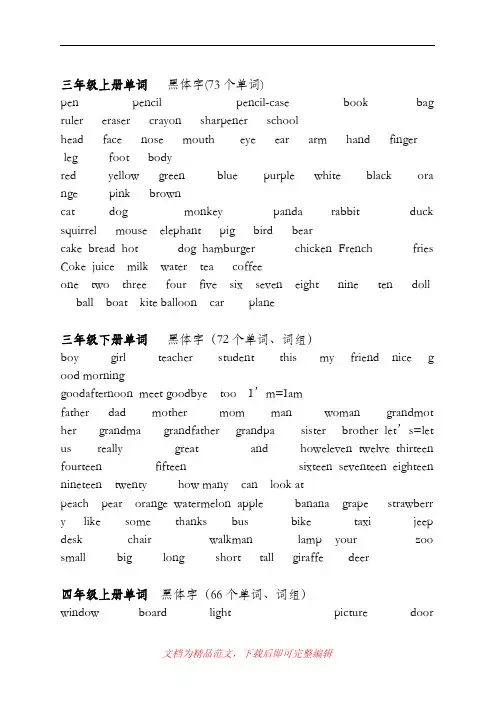
三年级上册单词黑体字(73个单词)pen pencil pencil-case book bag ruler eraser crayon sharpener schoolhead face nose mouth eye ear arm hand finger leg foot bodyred yellow green blue purple white black ora nge pink browncat dog monkey panda rabbit duck squirrel mouse elephant pig bird bearcake bread hot dog hamburger chicken French fries Coke juice milk water tea coffeeone two three four five six seven eight nine ten doll ball boat kite balloon car plane三年级下册单词黑体字(72个单词、词组)boy girl teacher student this my friend nice g ood morninggoodafternoon meet goodbye too I’m=Iamfather dad mother mom man woman grandmot her grandma grandfather grandpa sister brother let’s=let us really great and howeleven twelve thirteen fourteen fifteen sixteen seventeen eighteen nineteen twenty how many can look atpeach pear orange watermelon apple banana grape strawberr y like some thanks bus bike taxi jeep desk chair walkman lamp your zoo small big long short tall giraffe deer四年级上册单词黑体字(66个单词、词组)window board light picture doorfloor classroom computer wall fan teacher’s desk Chinese book English book math book schoolbag story-book notebook twenty-one thirty thirty-one forty forty-one fifty long hair short hair thin strong quiet friend(s) music science sports compu ter game paintingstudy bathroom bedroom living kitchen phone bed s ofa shelf fridge table rice fish noodles beef vegetabl e soup knife chopsticks spoon plate forkfamily parents uncle aunt baby driver doctor farmer nurse baseball player四会单词(36个)bag pencil pen book ruler pencil-case teacher student boy girl friendhome room school classroom window desk door chair bed rice beef bread milk egg waterchicken fish sister brother father motherdriver doctor farmer nurse四年级下册单词黑体词(50个单词、词组)playground garden teacher’s desk canteen art room computer room washroom music roomgym TV room lunch English class music class breakfast dinner P.E. class get up go to school go home go to bed sweater jeans pants socks shoes shortshot weather rainy windy cloudy colourful pretty cheap expensive sneakersslippers sandals boots sheep hen lamb goat cow tomatocucumber potato onion carrot四会单词(88个)computer board fan light this is my that your teacher’s desk picture wall floor yes itone two three four five six seven eight nine ten what time it’s o’clock mathChinese English P.E. music for class jacket shirt skirt dress T-shirt redblue yellow green white no not colour warm cold cool today jeans pant socksshoes let’s play football snowy sunny how much big small long short applebanana pear orange watermelon are they horse aren’t cat rabbit pig duck dogeleven twelve thirteen fifteen twenty how many there五年级上册单词黑体字(16个单词、词组)principal university student cabbage pork mutton empty the trash put away the clothes air-conditioner over in front of sky cloud mountain village city四会单词、词组(93个)young funny tall strong kind old short thin who’s=who is Mr what’s=what is like he’s=he is strict smart active quiet she’s=she is very but Monday Tuesday Wednesday Thursday Frid ay day have on Saturday Sunday do homework watch TV read books What about…? tooeggplant fish greenbeans tofu potato tomato for lunch we tasty sweet sour fres h saltyfavourite they’re=they are fruit don’t=do not grape cook the meals water the flowerssweep the floor clean the bedroom make the bed set the table wash the clothes do the dishescan’t=cannot use a computer curtain trash bin closet mirror end table bedroom kitchen bathroom livingroom in on under near behind clothes riverflower grass lake forest path park picture house bridge tree road building clean五年级下册单词黑体字(18个)January February March April May June July August September October NovemberDecember first second third fourth fifth Eighth ninth twelfth twentieth四会单词、词组(83个)do morning exercises eat breakfast have English class play sports eat dinner when eveningget up at usually noon climb mountains go shopping play the piano visit grandparentsgo hiking weekend often sometimes spring summer fall winter season which best swimfly kites skate make a snowman plant trees why because sleep Jan. Feb. Mar. Apr. May June July Aug. Sept. Oct. Nov. Dec. birthday uncle her datedraw pictures cook dinner read a book answer the phone listen to music clean the roomwrite a letter write an e-mail mom grandpa study fly jump walk run swim kangaroosleep climb fight swing drink water take pictures watchinsects pick up leavesdo an experiment catch butterflies honey count insects collect leaves write a reportplay chess have a picnic六年级上册单词黑体字(16个)plane ship subway science museum north south east west tonight tomorrowtake a trip read a magazine go to the cinema magazine dictionary vapour四会单词、词组(71个)by foot bike bus train how go to school traffic traffic light traffic rule stop wait get to library post office hospital cinema bookstore where please nest to turn right left straight then next week this morning this afternoon this evening comic book post card newspaper buy hobby ride a bike dive play the violin make kites collect stamps live(s) teach(es) go(es) watch(es)read(s) does doesn’t=doesnot singer writer actor actressartist TV reporter engineer accountant policeman salesperson cleaner where work raincloud sun stream seed come from soil sprout plant should then六年级下册单词四会单词(25个)taller shorter stronger older younger bigger heavier longer thinner smaller have a fever hurt have a cold have a toothache have a headache have a sore throat matter sorenose tired excited angry happy bored sad。
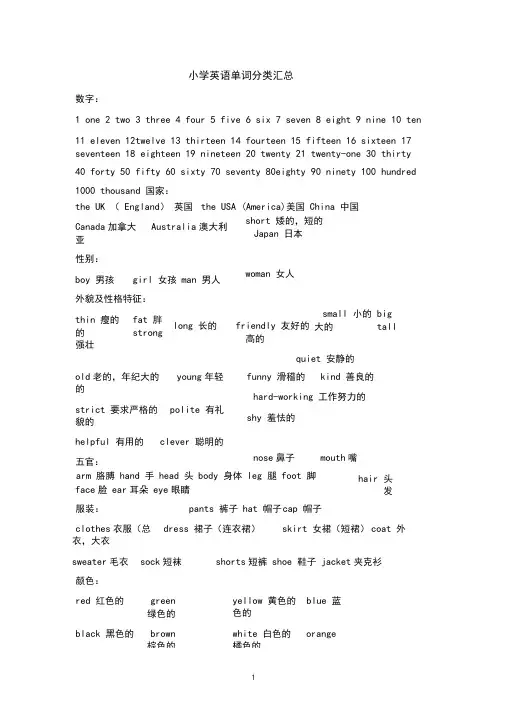
小学英语单词分类汇总数字:1 one2 two3 three4 four5 five6 six7 seven8 eight9 nine 10 ten 11 eleven 12twelve 13 thirteen 14 fourteen 15 fifteen 16 sixteen 17 seventeen 18 eighteen 19 nineteen 20 twenty 21 twenty-one 30 thirty 40 forty 50 fifty 60 sixty 70 seventy 80eighty 90 ninety 100 hundred 1000 thousand 国家:the UK ( England ) 英国 Canada 加拿大 Australia 澳大利亚 性别:boy 男孩 girl 女孩 man 男人外貌及性格特征:thin 瘦的 fat 胖的 strong强壮short 矮的,短的Japan 日本woman 女人small 小的 big大的 tall高的quiet 安静的old 老的,年纪大的young 年轻的strict 要求严格的 polite 有礼貌的helpful 有用的 clever 聪明的五官:face 脸 ear 耳朵 eye 眼睛 funny 滑稽的 kind 善良的hard-working 工作努力的 shy 羞怯的nose 鼻子 mouth 嘴 hair 头发pants 裤子 hat 帽子 c ap 帽子 dress 裙子(连衣裙)skirt 女裙(短裙) coat 外衣,大衣sweater 毛衣 sock 短袜shorts 短裤 shoe 鞋子 jacket 夹克衫long 长的friendly 友好的 the USA (America)美国 China 中国arm 胳膊 hand 手 head 头 body 身体 leg 腿 foot 脚 服装: clothes 衣服(总颜色:red 红色的 green绿色的black 黑色的 brown 棕色的yellow 黄色的 blue 蓝色的white 白色的orange橘色的glove手套scarf 围巾glasses眼镜sunglasses太阳镜shirt 衬衫物品特点:pretty 美观的expensive 昂贵的cheap 便宜的nice 好的水果:pear梨apple 苹果orange橘子banana 香蕉grape葡萄watermelon 西瓜strawberry 草莓peach 桃子fruit 水果食物:bread面包egg鸡蛋cake蛋糕fish鱼rice米饭beef牛肉chicken鸡肉noodles 面条sandwich 三明治salad 沙拉hamburger 汉堡ice cream 冰激凌hot dog 热狗soup 汤tofu 豆腐food 食物饮料:juice 果汁milk 牛奶water 水tea 茶coffee 咖啡Coke 可乐蔬菜:tomato 西红柿potato 土豆green beans青豆carrot 胡萝union 洋vegetable 蔬菜食物特点:fresh新鲜的healthy健康的delicious美味的hot辣的sweet甜的动物:horse 马cow 奶牛sheep 绵羊hen 母鸡duck 鸭子giraffe 长颈鹿pig 猪cat 猫bear 熊dog 狗elephant 大象ant 蚂蚁monkey 猴子bird 鸟tiger 老虎panda 熊猫季节:spring 春天summer 夏天fall/autumn 秋天winter 冬天天气:cold 冷的cool 凉爽的warm 温暖的hot 热的rainy 阴雨的sunny阳光充足的windy多风的cloudy阴天的snowy下雪的月份:January (Jan.厂月April (Apr.)四月February(Feb.)二月May (may.出月August(Aug.,lMarch (Mar.) 三月June(Jun.汽月September(Sept仇October(Oct.)十月N ovember(Nov.)H December(Dec升二月month 月份 year 年 next week 下星期 …years ago …年前 months ago …月前 last year 去年 last month 上个月 序数词:first (1st) 第一 second (2nd) 第二 third (3rd) 第三 fourth (4th) 第四 fifth (5th) 第五 sixth (6th) 第六 seventh (7th) 第七 eighth (8th) 第八 ninth (9th) 第九 tenth (10th) 第十 eleventh (11th) 第十一get up 起床 go to school 去上学 go home 回家 go to bed 上床睡觉星期:Mon.=Monday 星期一 Thur 尸Thursday 星期四Sun 尸Sunday!!期天时间: o ’ clock 点 evening 晚上Tues 尸Tuesday1期二Fri.=Friday 星期五 weekendmorning 上午noon 中午tonight 今晚 tomorrow 明天Wed 尸Wednesday 星期三 Sat 尸Saturday 星期六afternoon 下午 week 星期twelfth (12th)第十二fourteenth(14th ) 第十四twentieththirteenth (13th) 第十三 fifteenth (15th)go for a walk 去散步 go swimminggo on a picnic 去野餐go camping 去野营go shopping购物go fishinggo to the supermarket 去超市 go hiking 去远足 go running 去跑步go boating 去划船ride a horse 骑马 get together 团聚 look for beautiful leaves 找漂亮的叶子 do word puzzles 猜字谜write a letter 写信 write an email 写邮件do homework 做作业 do kung fu 练武术 do morning exercises 做早操 take pictures 拍照 playfootball 踢足球play ping-pong play sportsplay basketball打篮球play play the pip 弹琵琶 play the piano 弹钢琴 wash my clothes 洗衣® watch TV 看电视plant trees 种树play with snow 玩雪see a film 看电影take a trip去旅行clean my room 打扫房间draw cartoon 画漫画draw pictures 画画listen to music 听音乐cook Chinese food 做中国饭study Chinese 学汉语fly kites 放风筝sing English songs 唱英语歌曲speak Englis脱英语make a snowman 堆雪人visit my grandparents 拜访祖父母read a book 看书read stories 读故事pick apples 摘苹果take a dancing class 上舞蹈课buy a dictionary/comic book/word book/post card/gifts 买字典/漫画书/单词书/明信片/礼物have English/music/PE/Chinese/maths/computer/science /art class上英语/音乐/体育/语文/数学/计算机/科学/美术课have/eat breakfast. lunch. dinner 吃早/中/晚餐climb mountains 爬山send a postcard 寄明信片stay at home 呆在家里swim 游泳cook 烹饪sleep 睡觉jump 跳eat 吃drink 喝climb 爬usefork/knife/knife/spoon/chopsticks/bowl 用餐叉/刀/勺子/筷子/婉地点及场所:city 城市town 城镇science museum 科学博物馆post office 邮局bookstore 书店cinema 电影hospital 医院supermarket 超市park 公园library 图书馆shop 商店zoo 动物园school 学校home 家restaurant 餐馆factory 工厂village 村庄forest 森林river 江河lake 湖mountain 高山hill 小山tree 树bridge 桥building 建筑物house 房子room 房间bedroom 卧室living room 客厅study 书房bathroom 洗手间kitchen 厨房房间内物品:bed 床phone 电话table 桌子sofa 沙发fridge 冰箱ball 球car 小汽车boat 船map 地图toy 玩具key 钥匙candy 糖果clock 时钟plant 植物water bottle 瓶子bike 自行车photo 照片学校:classroom 教室desk 桌子chair 椅window 窗户blackboard 黑板light 灯picture 图画door 门fan 风扇wall 墙playground 操场teacher’s desk 讲台teachers’ office 教师办公室dining hall 饭厅grass 草坪gym 体育馆library 图书馆floor 地板first/second floor 一/二层computer 计算机 computer/art/music room 计算机 / 美术 /音乐教室 bag/schoolbag书包 ruler 尺子 eraser 橡皮 crayon 蜡笔 book 书 pen 钢笔 pencil铅笔 pencil box 铅笔盒maths book 数学书 English book 英语书Chinese book 语文书 storybook 故事书 notebook 笔记本介词:under 在•…下面 in front of 在•…前面brother 哥、弟 baby brother 婴儿小弟弟 sister 姐、妹 grandmother/ma 祖母grandfather/pa 祖父职业:pupil 小学生 student 学生teacher 老师 doctor 医生 nurse 护士cook 厨师driver 司机 farmer 农民 worker 工人 pilot 飞行员 postman 邮递员businessman 商人 police officer 警察 coach 教练 fisherman 渔民 scientist科学家 writer 作家 dancer 舞蹈家 singer 歌手 cleaner 清洁工 情绪:angry 生气 afraid 害怕 sad 难过 worried 担心的 happy 高兴的excited 兴奋的 see a doctor 看病 take a deep breath 深呼吸 count to ten 数到十 do more exercise 多做运动 wear warm clothes 穿暖和的衣服交通规则:turn left/right 向左/右拐 go straight 直走 crossing 十字路口 slow down 慢下来 stop 停止 wait 等待 on foot 步行 by bus 乘公交 by plane 乘飞机bytaxi 乘出租车 by ship 乘船by subway 乘地铁by train 乘火车by bike 骑自行车公共场合礼仪:keep to the right 靠右 keep the desk clean 保持桌子干净 talk quietly 小in 在•…里 on 在…上 behind 在•…后面 near 在•…边上 家庭成员:beside 在•…旁边next to 挨着•…between 在•…中间 above 在•…上面uncle 叔叔、伯父、姑父、姨夫、舅父parent 父母 cousin同辈表亲aunt 姑母、姨母声谈话主格:I 我you 你,你们 he 他she 她 it 它we 我们 they 他们宾格:me 我you 你,你们him 他her 她it 它us 我们them 他们形容词性物主代词:my 我的your 你的,你们的his 他her 她的our 我们的their 他们的its 它的名词性物主代词:mine 我的yours 你的,你们的his 他的hers 她的ours 我们theirs 他们的its 它的小学英语基本句型常见的疑问词:when 什么时候(问时间) which 哪一个(问选择哪一个) 一、以How many 开头的特殊疑问句,How many 后面接可数名词复数形式, 通常在名词后面加-s 或者es.以How many 开头的特殊疑问句,回答要用数字,How many books do you have? ----- I have 2. How many pens can you sed ------- I can see 3. How many people are there in your family? Three. How many sheep are there? ---- Fifteen.二、以How much 开头的特殊疑问句,回答要用价格。
人教版小学英语总复习知识大全 +完整版小学英语复习资料 小学英语总复习,知识大全,人教版 可数名词变复数规则如下: 规则变化: 一般情况下直接加-s。如:map-maps boy-boys 以s, sh, ch, x 结尾加-es。如:bus-buses watch-watches (1)以辅音字母加-y结尾,变y为再加-es。如:baby-babies hobby-hobbies (2)以元音字母加-y结尾,直接加-s。如:boy-boys holiday-holidays day-days 4.以o结尾的名词变复数时: (1)如果表示无生命的东西直接加-s。如:piano-pianos photo-photos (2)如果表示有生命的东西(如:人、动物、植物等)加-es。如:potato-potatoes tomato-tomatoes 5.以f结尾的名词构成复数时,变f为v再加-es;以fe结尾的名词构成复数时,变f为v再加-s 如:leaf-leaves树叶 knife-knives刀 wolf-wolves狼 不规则变化:(需要特殊记忆) 1.如:child-children foot-feet man-men woman-women 2.单复同形:如deer,sheep,fish,Chinese,等。
三单形式变化规则: 一般情况下,直接在动词词尾加-s. 例如: likes reads 2.以s, ch, sh, x, o结尾的词,一般在词尾加-es. 例如:goes watches teaches 3.以辅音字母加y 结尾的词,应先变y为I, 再加-es. 例如;study—studies 4. 以元音字母加y 结尾的词,直接在词尾加-s.例如: play--plays
动词的现在分词变化规则: 一般情况下在动词原形词尾加-ing。如:play-playing do-doing 以不发音的字母e结尾的动词,先去e,再加-ing.如:make-making ride-riding 末尾只有一个辅音字母的重读闭音节词,先双写末尾的辅音字母,再加-ing。如: swim-swimming stop-stopping
第三人称单数主语: 人称代词:he(他) she(她) it(它) 单个的人名、地名或称呼做主语时,是第三人称单数主语 单数可数名词或者“this(这个)/ that(那个) / the +单数名词 ”作主语 不定代词something(某事)somebody(某人) this(这个) that(那个) 等也是第三人称单数。 在一般现在时中,当主语是第三人称单数时,谓语动词要用第三人称单数形式,即常在动词原形后面加-s或es. She likes..... He goes...
基数词与序数词: 表示数目多少的数词叫做基数词。如:one 1 two 2 three 3 four 4 five 5…… 表示顺序的数词叫做序数词。如:first(1st ) second( 2nd ) third( 3rd ) fourth (4th )fifth( 5th)……
现在进行时: 现在进行时表示说话时正在进行或发生的动作。 现在进行时的构成:be的现在式(am, is, are)+现在分词(动词-ing)构成。 现在进行时的基本用法: (1)表示此时此刻正在进行或发生的动作。 What are you doing? 你正在做什么? I’m reading a book.我正在读书。 (2)有时表示将来的动作。 He is coming this afternoon.他今天下午要来。
一般将来时: 1.be going to +动词原形表示即将发生的事或打算、计划、决定要做的事(这种计划或打算有可能更改)。 2.will +动词原形常用于表示将来一定会发生的事(不能更改)。
冠词:本身不独立使用,只能放在名词前面,帮助说明名词说指的人或事物的含义。 冠词有两种,一种是定冠词,指the; 一种是不定冠词,指a, an。 定冠词the的用法: 定冠词the可以用来指谈话双方都知道的人或物。如:The girl is my sister. 这个女孩是我的姐姐(或妹妹)。 定冠词the可以用来指上文已经提到过的人或物。如:I have a dog. The dog is black.我有一只狗。这只狗是黑色的。 定冠词the用在部分专有名词前面。如:the USA美国 the PRC 中华人民共和国 乐器类名词前加定冠词the。如:play the violin 拉小提琴 play the piano 弹钢琴 定冠词the用在 世界上独一无二的事物前。如:the moon太阳the moon月亮 the Great Wall 长城
定冠词a, an的用法: a用在辅音起首的单词前(不是字母,而是发音)。如:a university student 一个大学生a book一本书a dog一只狗。 an用在元音起首的单词前(不是字母,而是发音)。如:an apple一个苹果 an actress一名女演员 用在单数可数名词前,泛指某一类人或事物的一个或一类。 Mr. Han is an English teacher.韩先生是一位英语教师。 Please give me a cup of coffee.请给我一杯咖啡。 (3) 泛指某人或某物,但又不具体说明何人何物。例如: I can see a kite.我能看到一个风筝。 (4) 表示“数量”,有“一,每一”的意思。例如: We have six classes a day . 我们一天上六节课
感叹句: What+不可数名词+主语+谓语+其他! What cold weather it is! 多冷的天气啊! How +形容词/副词+主语+谓语+其他! How beautiful the dress is! 好漂亮的一件 裙子啊!
表示方位的几个介词/介词短语: 1.in 在…里面 2.on 在…上面 3.under 在…下面 4.behind在…后面 5.near 在…附近 6.over在…上面 7.in front of 在…前面 8.next to 与…相邻 on与over的区别:on表示与物体表面接触; over表示与物体表面不接触。如: There is a cup on the table.桌子上有一个杯子 There are two bridges over the river.河面上有两座桥
几个常考的疑问词: what 什么 which 哪个 where哪里 why为什么 how 怎么,如何 who谁 whose谁的 when 什么时候
如何询问时间: What time is it (now)? 现在几点了? It’s 5:00. (现在)五点了。
如何询问天气: What’s the weather like (today)? 天气怎么样? How is the weather like (today)? 天气怎么样? It’s warm/cool/hot/cold(today). (今天)天气温暖/凉爽/炎热/寒冷。 It’s windy/cloudy/sunny/ rainy /snowy(today). (今天)天气是刮风的/多云的/晴朗的/下雨的/下雪的。 如何询问星期几? What day is it today? 今天星期几? It’s Wednesday. 今天周三。 如何询问日期? What’s the date (today)? 今天几月几号? It’s May 20th. 今天五月二十号。
询问某人最喜欢的…? 1. What’s your favourite+…? 你最喜欢的…是什么? 2. Which …do you like best? 你最喜欢的…是哪个/什么? What’s your favourite food/fruit/season? 你最喜欢的食物/水果/季节是什么? Which food/fruit/season do you like best? 你最喜欢的食物/水果/季节是什么?
如何询问爱好? What’s your hobby?你的爱好是什么? I like collecting stamps. 我喜欢集邮。
如何询问他人的职业: What does +主语(第三人称单数)+do? 或者What’s is +主语(第三人称单数)? 主语(第三人称单数)+ is a/an+ 职业名词。 What does your mother do?/what’s your mother? 你的妈妈是做什么的? She is a TV reporter. 她是一名电视台记者。 How many 与How much的区别: how many 与how much都有“多少…”的意思 how many修饰可数名词 How many crayons do you have? 你有多少支蜡笔? How many sheep are there? 有多少只绵羊? how much修饰不可数名词 How much water is there in the cup? 瓶子里有多少水? how much还可以表示“多少钱”。 How much is it?多少钱? How much are those shoes? 那些鞋子多少钱? play 的用法: 表示演奏乐器: play the +乐器(play 表示“演奏”乐器) play 与表示乐器的名词要用定冠词“the” 如: play the violin 拉小提琴 play the guitar 弹吉他 play the piano弹钢琴 play 与球类搭配不加任何冠词。如: play football 踢足球